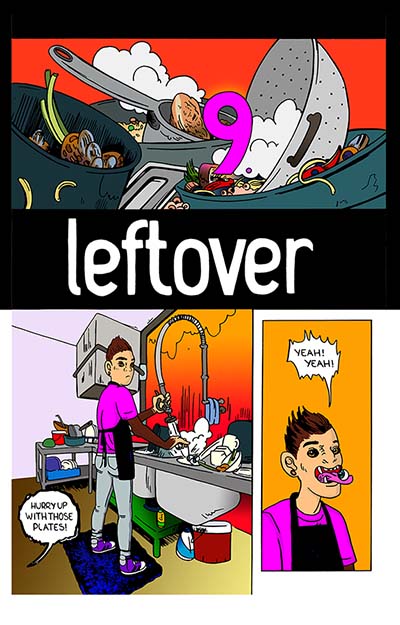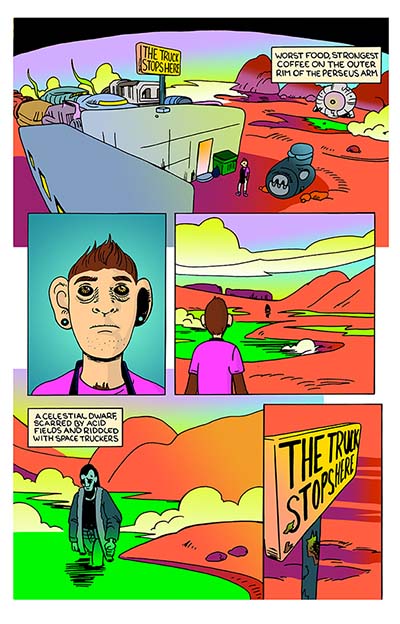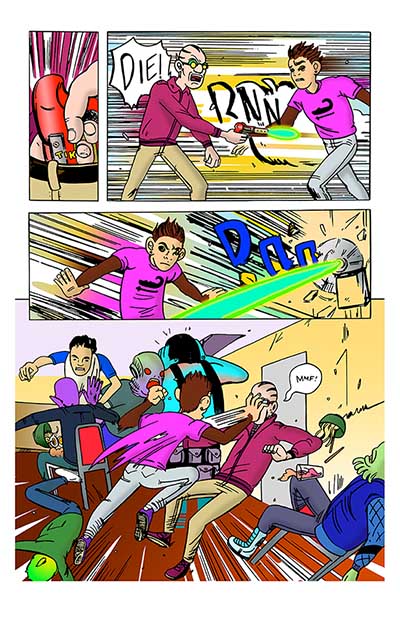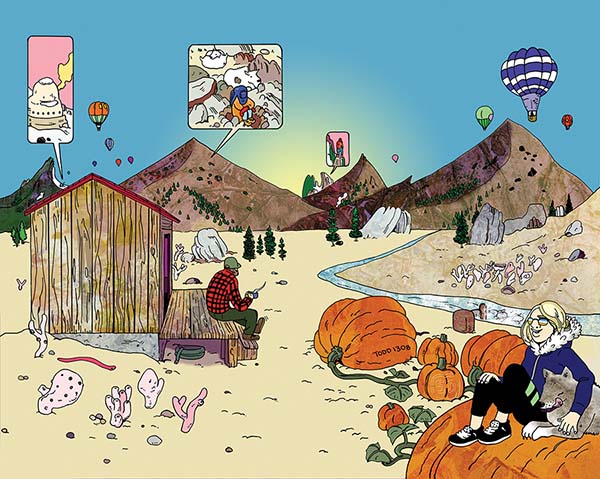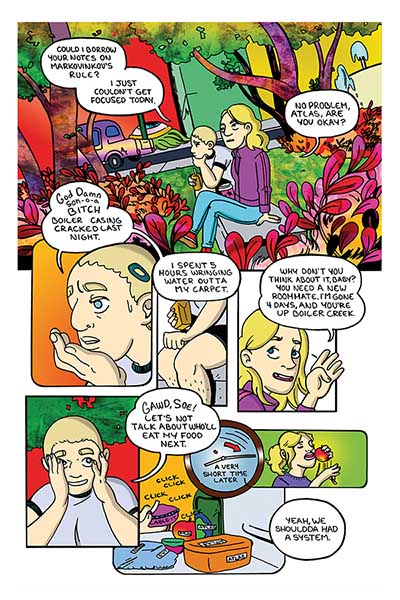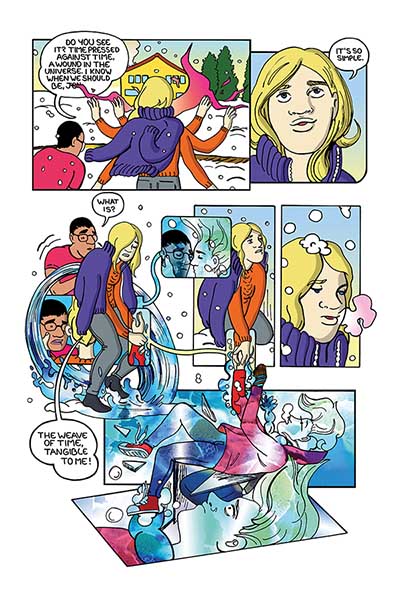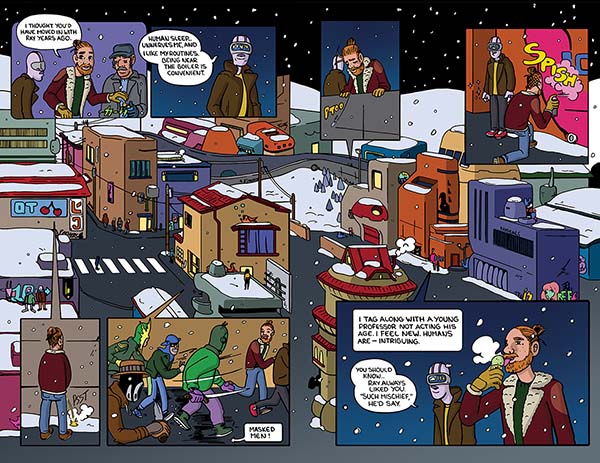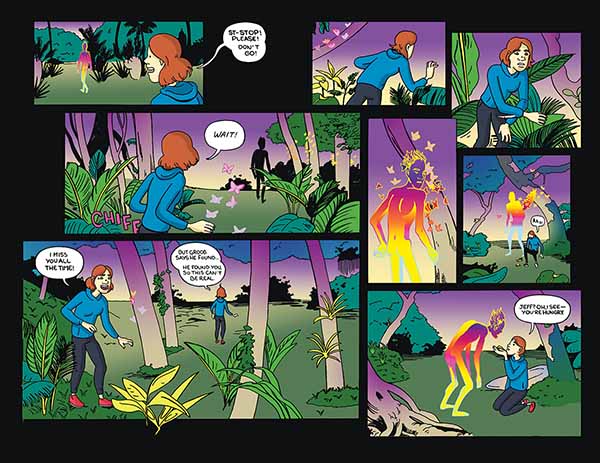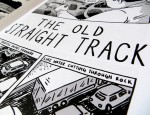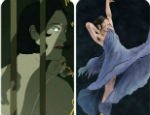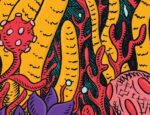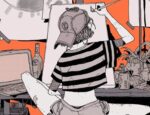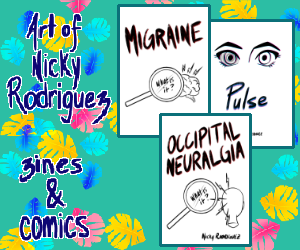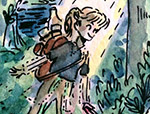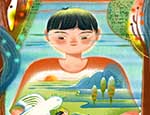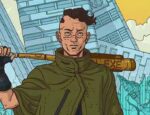Currently crowdfunding via Kickstarter (back it here!) Infinite Wheatspace Volume 1: Catalytic Conversions from Avery Hill Publishing compiles the first nine self-published issues of this genre-defying epic series from the unique imagination of cartoonist L. Pidge. If you want a Broken Frontier recommendation we lent our support to the publicity for the book with the following quote: “Infinite Wheatpaste isn’t simply a world-building triumph… it’s a universe-building one. Immersive character-driven storytelling on an epic and yet still very personal scale.”
With a week still left on the crowdfunding campaign we are delighted today to publish the following piece on Infinite Wheatpaste, its characters, and its ambitious scope. It’s less an interview than a fascinating and wide-ranging conversation between ever supportive friend of BF Shelly Bond (Off Register Press, Vertigo, Black Crown) and Pidge…
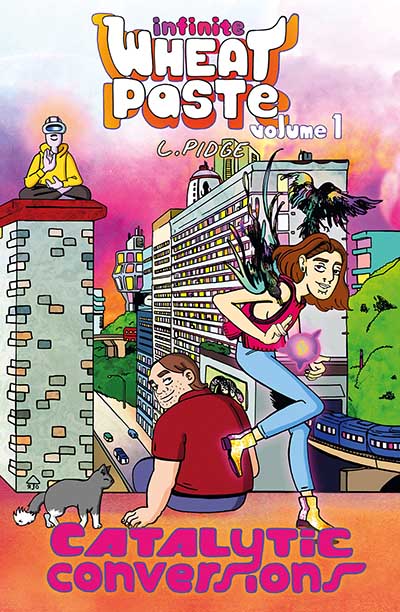
SHELLY BOND: Pidge, thank you to you and everyone at Avery Hill Publishing for asking me to interview you about the Infinite Wheatpaste Kickstarter! I’m so excited for the world to read it. I discovered you when you were kind enough volunteer your time and your artistry for Insider Art, and since that day I feel like I’ve been so lucky to get to know you and get to know the magic that you bring to your personal work.
I’d like you to explain how you’ve been working on Infinite Wheatpaste all these years – you are a one-person operation! And now through the magic of small press publishing, the rest of the world is going to get a chance to see your incredible project in a collection as long as we reach enough people. So let’s do this!
PIDGE: Thank you! Avery Hill has been an awesome team and I’m really grateful to everyone who’s helped bring this into a collection. It’s been my single issue series since 2016. I worked out a lot of the ideas in 2015, but it’s something that continues to change and grow as I have a relationship with the characters. They really tell me where this story’s going. It is Sci-Fi and it is Magic, but those are more like vehicles to tell a story about people and relationships. I think ultimately it’s a story about how no-one is insignificant.
I have a significant death in the first issue, and I like that it’s a death that the audience doesn’t have a connection with until you see who this person was through everyone who he affects. And that we’re all ultimately connected, and what one relationship can do to so many, it really does all come out from that. When this character dies in the first issue the bystanders say really dismissive things, and I think it feels like when you lose someone that the world can pass you by. And a big part of me wanted to say – whoever you lose, even if the world keeps moving, they’re always important. Even to people they didn’t meet.
SHELLY BOND: It’s a really brave and bold way to introduce a cast of characters and a world that’s very much like our own world… and yet it’s not because of the pixie dust, the magic, the peculiarities. There are so many things about it that are to me very much Science Fiction in the same way that I view Paul Pope’s THB. I’m not sure if that’s a comic that you’ve read, but it has its own very particular world-building and so much of it is about art and science and chemistry. And it’s about taking all the laws of physics and putting them in a blender and shaking it then pressing ‘Mix’ and then taking everything out, drinking it, then pouring in something else that’s unrelated. That to me is the magic of comics.
I think you bring your own mixture and your own method of making comics to Infinite Wheatpaste. What I find terrific about the characters is that you never feel lost every time you’re with a character. Whether it’s Addy, or Jeff, or Abe – you know that character has a counterpoint or a ‘partner in crime’. Maybe it’s a former paramour, maybe it’s a current conquest – but you always know when you meet one character that there’s a significant other part of them that exists in another person. And that to me is your cohesive tissue… your connection in the ensemble cast.
Something I want you to share that I think’s really important to indie comics makers and indie comics readers, is that you’ve been working on this book for many years and you do it in tandem with a day job. The fact that you’re able to write it and draw it and print it and physically assemble it with staples – this comic shows how important it is to get your story out into the world. I like people to know that, because I had no idea you were totally DIY. Share a little bit of what that means to you, and how that makes it even more of a major event that a publisher has discovered you and now is putting your book out in trade paperback form at a really reasonable price, so that it can have global outreach.
PIDGE: The single issues are really important to me – I love comics as an art form. I think if you love comics you’ll love Infinite Wheatpaste. I’m really sort of a cartoonist’s cartoonist – I’m all about that experience. I’m on the younger side of people who can still remember when comics were on the stand, and that tangibility, that experience is so important to me and so important to Wheatpaste. A lot of people when they picked up those single issues didn’t realise it was DIY because I wanted it standard size, I wanted it saddle-stitched perfectly – all of those elements, it’s so important.
I’m not as much of a music person, but when music people pick up an album and they go through the liner notes – I am that person for comics. I think we get into almost like the ‘fast fashion’ version of comics where it gets thrown together and people don’t think about how you as a reader experience it, and to me that’s so important. And talking to Avery Hill, a big part of it was what should that experience feel like when it’s in a collection. So it’s been important to me to maintain that sense of direct communication with the audience.
SHELLY BOND: That’s creative integrity, and that’s why comics as art form is what I’m about in the 21st Century! What did you change when you went from periodical to collection?
PIDGE: I just learned a lot about making comics through making comics, and the only way to learn is to do it. I think going back, I had an experience with a wonderful editor named Shelly Bond who really helped me learn how to critically and formalistically look at not just style, but story and clarity. So I went back and made some clarity choices that I just wasn’t in a place to see where they didn’t work when I started making this comic. They’re very minor changes, but I I tried to make ones that were really effective in communication.
SHELLY BOND: And what about colour? I’m a periodical reader but I also backed the collection, so am I in for something a little different from this experience? Other than I’m going to be opening one book and I’m not going to stop until I finish, because that’s the kind of storyteller you are. You’re the kind of storyteller who makes the reader fall into the pages and become one with the paper essentially – which meant that when I finished an issue of the original Infinite Wheatpaste I was angry with you because I wanted more and I didn’t have any more at that moment! The good news for backers of the trade is they’ll actually be able to sit down for hours they won’t have to get up for days if they choose to, because there it is – the first nine issues in one package!
PIDGE: Yeah I was derelict to not mention it’s in colour now! It was a huge process so maybe I blocked that out because it was a lot of work. I did all the flats and really cleaned up the line work. I didn’t know what I didn’t know when I was doing it DIY, so I really had to go through and clean the digital files with a fine tooth comb. I made a lot of work for myself… I didn’t know I was being lazy, I just didn’t know how to do it yet.
SHELLY BOND: It’s the best way to make comics – you’ve got to be all in, and if you can’t do it yourself, pay someone to push you off the diving board, that’s what I say! It’s impressive to hear that you just went for it anyway. you might have been paying for it later – I know that you spend a lot of last year colouring.
PIDGE: Well full credit to Chase, my spouse. He went through and did the colours. And I had things that were very particular – it’s a very dense comic with a lot of the background gags – and when I went back I’d forgotten how many jokes I hid in there. I have background characters who I know go through the entire comic, so I was very particular “no no – that person is in this issue too” and having to flag which ones were actually there through the whole thing. I think I’m the only person who’ll notice.
SHELLY BOND: No, you forgot about me. I’ll be looking for those those Easter eggs! Those are the very things that make comics my favourite medium, because you have the participatory extras you get on further inspection. That’s why comics like yours deserve multiple reads. Tell me if you can, without spoiling too much – what would be one of your favourite visual gags that you want anyone who smart enough to be reading this to keep an eye out for?
PIDGE: I don’t name this character until issue fifteen, but they’re in there as far back as I think issue two. The Vending Machine Bandit is absolutely my favourite. That just came out of when I was starting this comic – I worked a night job and I would drive home and just be tired, and I live in a cold and very rural place, so it just felt desolate going home. And when I think of my version of mischief it’s always something very innocuous, and I had a very recurring compulsive thought to unplug vending machines on my way home. Just like – “get those day people!” So the Vending Machine Bandit is someone who works long night jobs and unplugs vending machines on their way home, and there are ‘wanted’ posters for them around Half Moon City.
SHELLY BOND: Amazing. Now talk to me a little bit about the characters. I name-dropped a few of them before, but let’s deep dive into the two that you think are the most important characters for potential backers to know about. You got us in with a death, and to come in on a new series with grief is sometimes daunting, but you do it in such a brilliant way. It’s like a study in characterisation. So the characters – give us a couple of sentences.
PIDGE: I think Addy really gets underestimated. She’s really the glue between a lot of those relationships. She’s the least extraordinary member of the cast, as far as she’s not a goddess, she’s not a witch. She’s just a person navigating human beings and robots and clones and everyone with care. And not always getting it right, she’s really clumsy, she calls herself out for occasionally being inconsiderate especially with her partner. She’s very grounding. And Otis – I have big plans for Otis, but I think I just love his gentleness. He’s only in one issue of the nine that are collected, but I think the audience will love him in a big way. He’s not yet connected to the main cast, but he’s absolutely connected to the main cast.
SHELLY BOND: Something else I’m curious about – what do you mean when you say there are consequences in Infinite Wheatpaste? That’s a word that comes up a lot in conversation.
PIDGE: It goes back to those relationships. I don’t think anyone can have a relationship without consequences, good or bad. I think we all affect each other and that’s just the humanness of the story. The death in the first issue actually directly relates to where Volume Three will end. Avery Hill currently has me signed on for three volumes, and I have plans beyond that… but that’s thirty or so issues where one thing really propels so much else. And we as people can’t help but affect each other.
SHELLY BOND: This has always been a sprawling epic for you. To me it’s Star Wars, it’s Fables or Sandman – it’s evergreen. It’s the kind of story that I like to read, because whether I read issue one or issue four, back to back or three months apart, I feel like you’re able to write a self-contained story that tugs at heartstrings and makes me care about the characters. And yet each time I read an issue I always feel like you’re expanding the scope, not just of the relationships and human nature, but the environment and the possibilities of future tech and magic, and how those two things relate to each other and sometimes cancel each other out or negate each other. Is that a fair assessment?
PIDGE: I think that the tech and the magic are so incidental in some ways. I think it’s just because I make big mental leaps or big connections that are there probably not there, but I think it’s because I still let my brain play, and I let myself daydream. There’s a great Neil Gaiman quote that I think about often with daydreaming and the process of writing (which is harder for me – it takes more work and more time to do the visual side of a comic, but.)
The difference between writers and other people is that they notice when they’re having a good idea. They notice when they’re daydreaming, they notice that creative process happening, and they don’t dismiss it. I think we get trained to write a certain way in school or read a certain way, and we have to interpret texts similarly and we start negating these broad leaps. So when magic and tech are there, it’s really that I’m making broad leaps between people more than, in time… I don’t think Infinite Wheatpaste is what the future is going to look like. I think people always look the same, and a spaceship is just another another cruise liner. It’s another way to tell something we all understand.
SHELLY BOND: I think that’s extremely profound in so many ways. Because if you think about where comics are at the moment – there are so many, and there are titles that are fighting for limited attention spans and limited funds. We’re in the midst of a recession in some countries and it’s a it’s a pretty frightening place. There’s so much out there, and how much of it is great stuff? And I think it goes back to what you were saying about how as students of literature and students of the world, we’ve gotten to a point now where you can just click a few buttons and find out seven types of plots that Margaret Atwood recommends or has used in her stories, and what are Neil Gaiman’s tips on writing a comic in his masterclass series.
You can accumulate as much knowledge as you want, but the bottom line is if you want your story to be told in the only way it can be told – which is how you’re telling it yourself – you have to actually push the research aside and put pen to paper. You have to start writing and drawing or else you’ll get lost from the history pages. The only way you should represent yourself and your ideals and your ideas is through you. So I very much appreciate your vision in this series, and how you as an artist and a cartoonist actually get the message out there.
PIDGE: You have to create the story that you want to see, and you can only create the stories that are in you. I just like stories that are complex and rich and are more like a relationship – I think when you read Infinite Wheatpaste, the longer you read it you realise that it’s a relationship between the artist and hopefully the person who reads it, not just those characters. That hopefully it’s a world that you feel like you’re a part of. I just don’t like one punchline kind of jokes, and I’m really grateful to you making the Sandman and the Fables comparisons.
I think about Love and Rockets often, because they do go into strange places but I don’t think any of those stories you could just say “it’s this.” And “it’s in the title, it’s right there. There’s nothing else to be explained.” There are so many things competing for attention where they just want to put what it is right in the title, and not give anything else to the viewer. I can open that comic and I know what it is – I don’t have to dive into that comic and build a relationship with it. I don’t see that the artist has actually hidden all these things for me just because they love that place. I think it a lot of people just write a one punchline joke and they move on to the next one.
SHELLY BOND: I think that’s what makes sense in your title. If I’m extrapolating it correctly, Infinite Wheatpaste means you could you could just paste up flyers and posters and billboards and signs and directives, and it could be a band poster or it can be a political statement. But it’s layers of information that could go on top of each other, and sometimes they’re ripped off and maybe you’re only seeing part of the past or the future. But it’s layers of meaning, and how we interpret things from yesterday – today – tomorrow, and what essentially what they mean to us as humans, as people who walk this earth for a finite amount of time. That’s what I’m getting from your title – please tell me if I’ve come close!
PIDGE: I love that, I’m gonna steal it. But it’s also just… when I was making this comic I was working a miserable job. I would literally feel sick on the way to work, and I had to make something that saved me. Infinite Wheatpaste feels like that thing, and I had a few working titles the first couple of years while I was putting things together and drawing the comic. I settled on Infinite Wheatpaste because I love the idea that wheatpaste graffiti doesn’t damage anything, and I would never want to cause any kind of harm, but it does enter public spaces.
And I like the idea of DIY – I just decided come hell or high water I was going to make this comic whether anybody ever read it or not. And thankfully some really cool people have, and hopefully some more awesome people will. I did a terrible job pitching to Ricky from Avery Hill – I just told him I was gonna make Infinite Wheatpaste whether anybody ever published it or not. So – good if you guys want to do something with it, if I like it. I don’t like it, I’ll keep making the comic I want to make.
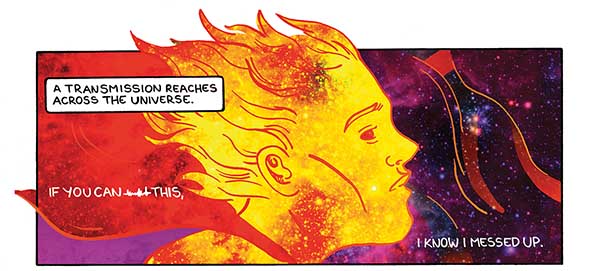
SHELLY BOND: And you’ve proved that to yourself and to the world at large, whether your print run was twenty copies for issue one or two hundred for issue fourteen. The fact that you’re making comics no matter what, to me is the way we live now – those of us who are lucky enough to live and breathe and love comics in our bones. So I’m happy about that! I’m going to ask one more question – what type of reader do you think that Infinite Wheatpaste is perfectly tailored for? And you can have a couple of different answers!
PIDGE: I think that if you love comics as an art form – a direct expression from one person to another – if you want that feeling of direct communication, then it’s for you. I want you to feel my reaching out and my connection to you. I think that the characters do that to each other, and to the reader. If you love comics in a way that you ferociously digest them – you take them in and you read them again, I think Infinite Wheatpaste is for you. You’re so right about that tenacity to make comics at this point that they’re not in the grocery store anymore, and I think the reader has to have that tenacity to look for comics too. It’s not just the people making them, I think the people who still read comics do it because they love them just as much as we do. And if you’re that person, I think this comic directly reaches to you.
SHELLY BOND: Infinite Wheatpaste is one of those comics that I have a few duplicates of because I’ve had favourite issues, and I’ve had to send them to friends (especially friends who are in need of reading something they’ve never read before, that has a tenor unlike anything else, and has a way of lingering…) And although you start off your story with death and there’s grief – this comic has so much raw hope and beauty in it that I can’t imagine anyone who reads this not being in love with it. And desperate to read the next volume, after they get the first nine issues in one beautiful package that’s so reasonably priced with so many special extras, if they’re interested in getting a poster or a beautiful tote bag (that I believe you’re hand-screen-printing yourself?)
PIDGE: Yes! Thank you so much. Yeah it does start with grief but it’s all about life cycles and that death comes with so much new life in the form of Abe and Otis is so important to that life cycle. I can’t wait for people to read it.





